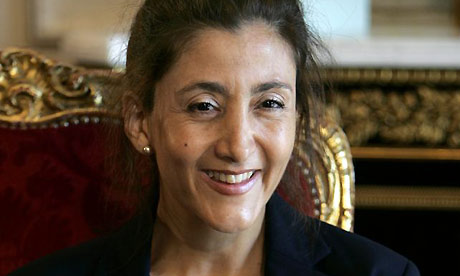Interview: Ingrid Betancourt The Guardian.co.uk
She is the French-Colombian politician who was kidnapped by Farc guerrillas in 2002 and released last July in a daring rescue operation. Back in Paris, she talks to Ed Vulliamy about the spiritual discipline that got her through six years of torture and humiliation in the jungle - and the sweet pleasures of freedom.
Ed Vulliamy about the spiritual discipline that got her through six years of torture and humiliation in the jungle - and the sweet pleasures of freedom.
She is the French-Colombian politician who was kidnapped by Farc guerrillas in 2002 and released last July in a daring rescue operation. Back in Paris, she talks to
 Ed Vulliamy about the spiritual discipline that got her through six years of torture and humiliation in the jungle - and the sweet pleasures of freedom.
Ed Vulliamy about the spiritual discipline that got her through six years of torture and humiliation in the jungle - and the sweet pleasures of freedom.Today in Paris as she sips Coca-Cola, she says that 'with time' she will recount what happened. 'I was abused, humiliated, insulted and tortured.' Tortured how? 'Physically and mentally', is all she will say. 'I was chained, after the first escape attempt, initially by night, later throughout night and day.' At one point, 'I was made to stand for, I think, three days and nights, chained by the throat, to a tree.'
Part of the punishment was to repair the guerrillas' webbing and ammunition belts. This work involved using string with which Betancourt managed to weave herself a rosary, 'which I carried with me everywhere, and still do'.
by Ed Vulliamy
. . . asked her about 'le retour à la civilisation', to which she replied: 'Adapting to pre-history was very difficult, but adapting to civilisation is immediate!' Can this be true, I ask her now. 'Yes!' she says. 'It took no time. After six years without seeing one, I love just seeing a smile - every smile I see gives me hope.'
This brings us to the kernel of the conversation: why is it that trauma and desolation can make people believe more insistently in the human spirit, rather than abandon all faith in it? 'Maybe this,' says Betancourt. 'I was in a situation where I had to make a decision: I could follow the path of cynicism, or that of some kind of spiritual discipline and faith. The first would be easy, the second very hard. The first is about ego, and what is happening in front of you. The second is about the battle inside you, beyond these events, that one that gives life meaning. I chose the hardest path, but once I had decided to follow that path, it was like having wings. I wanted to look at everything another way.
'Take the other hostages. When you live for so many years like that, with people you would not otherwise meet in life, you realise that humanity has a common soul. I thought about the guards too: if I am ever out of here, how will they remember me? Who will they tell themselves they are, if I try to communicate to them that I have taken this path, and not that of cynicism?'
This is redemptive Christianity, I (EV) suggest. 'You and I can call it that, but it is no specific faith,' she chides. 'It could be any religion. It is a deep belief in God and the human spirit. And that is why the return to civilisation is immediate. Because once I had made my decision, I never let go of that belief - not in the jungle, or since.'
Comments